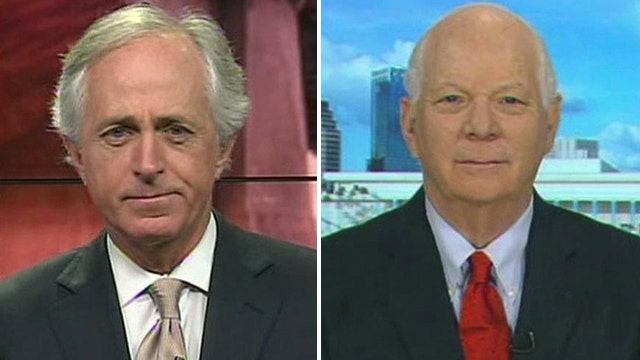EDITOR'S NOTE: A prior version of this report incorrectly stated when a written statement about sanctions legislation was released.
Congress is voicing widespread, bipartisan skepticism about the deal between the United States and Iran to curb that country’s nuclear program, with several senators vowing Sunday to weigh additional sanctions on the isolated Middle East country.
The concern follows the overnight deal in which the U.S. and five other world powers agreed to ease billions of dollars worth of import-export sanctions in exchange for Iran curbing its nuclear-enrichment program and a range of reaction off Capitol Hill.
Sen. Bob Corker, the top Republican on the Senate Foreign Relations Committee, told “Fox News Sunday” that Iran was celebrating because its deal overnight with the U.S. and the five other world powers allows it to continue to enrich uranium while getting billions in crippling sanctions lifted.
“They’re spiking the ball in the end zone,” Corker said.
He also said his greatest concern was that the Obama administration wouldn’t follow through on the terms of the deal -- including daily inspections on Iran's nuclear facilities and ensuring that the country sticks to new thresholds for nuclear enrichment -- below levels toward building a nuclear weapon.
He also repeatedly said he didn’t want the interim deal to “become the norm” and suggested Congress is ready to reinstate sanctions and impose more.
Corker was among 14 senators who, on Thursday, put out a statement vowing to pursue sanctions legislation.
“A nuclear weapons-capable Iran presents a grave threat to the national security of the United States and its allies and we are committed to preventing Iran from acquiring this capability," the group said. “We will work together to reconcile Democratic and Republican proposals over the coming weeks and to pass bipartisan Iran sanctions legislation as soon as possible.”
Lawmakers made clear on Sunday that they'd continue to prep the legislation as a fallback.
The key points of the deal require Iran to halt progress toward its disputed nuclear program, in exchange for modest relief from U.S. economic sanctions that include now having access to $4.2 billion from oil sales.
Iran agrees to turn off centrifuges, stop construction and fuel production at an unfinished nuclear reactor, limit its enrichment of uranium – needed to make a nuclear bomb -- to 5 percent and dilute its stockpile of 20 percent-enriched uranium.
Menendez, the foreign relations committee chairman, was among the most critical Democrats.
“The interim agreement reached is but a beginning and a product of that policy,” he said in a separate statement. "In my view, this agreement did not proportionately reduce Iran's nuclear program for the relief it is receiving. Given Iran's history of duplicity, it will demand ongoing, on the ground verification.”
California Sen. Dianne Feinstein, chairman of the Senate Intelligence Committee, offered what appears to be some of the most unequivocal support for the deal.
“I support the agreement … which I believe is a significant step toward solving one of the most difficult security challenges facing the world today,” she said, while also expressing caution. “By any standard, this agreement is a giant step forward and should not be undermined by additional sanctions at this time.”
Cornyn was among the most critical of the historic deal that President Obama is hailing as an “important first step.”
“Amazing what WH will do to distract attention from O-care” tweeted Cornyn, referring to the White House and ObamaCare.
His remark drew sharp rebuke from Obama 2008 presidential campaign manager David Ploufee.
“No, a real distraction would be war. Like Iraq,” he tweeted in response.













































